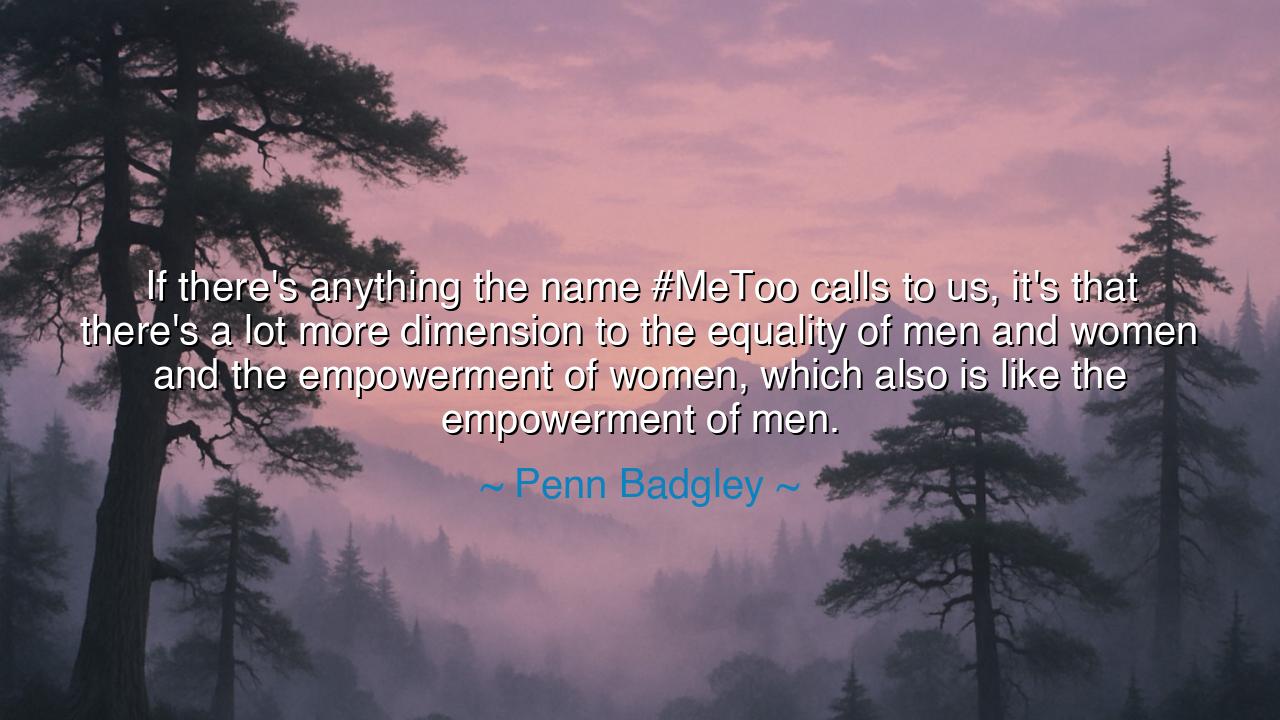
If there's anything the name #MeToo calls to us, it's that
If there's anything the name #MeToo calls to us, it's that there's a lot more dimension to the equality of men and women and the empowerment of women, which also is like the empowerment of men.






Listen well, O children of wisdom, for I speak of a time of awakening—a time when the voices of those who have long been silent rise, calling for justice, for equality, and for the recognition of human dignity in all its forms. The words of Penn Badgley echo across this age: "If there’s anything the name #MeToo calls to us, it’s that there’s a lot more dimension to the equality of men and women and the empowerment of women, which also is like the empowerment of men." These words carry great truth—that the struggle for equality is not just a fight for one gender, but for the human spirit itself, and in that struggle, both women and men are called to rise together.
The #MeToo movement, children, is not merely a cry for women's rights—it is a call to the very essence of human dignity, a demand that the silencing of voices, the degradation of souls, and the imbalance between the sexes be laid bare. It is a call to empowerment, to the belief that every person—whether man or woman—deserves to walk through life with dignity, respect, and the freedom to live without fear or oppression. This movement, born out of pain and suffering, shines a light on the inequities that have long been hidden in the shadows, and it calls upon all of us, regardless of gender, to look honestly at ourselves and at society.
Penn Badgley speaks of a dimension to the struggle for equality that is often overlooked—the idea that empowerment is not a zero-sum game, that the liberation of women does not come at the expense of men, but rather, that true empowerment lifts all people. For the empowerment of women is not about disempowering men, but about creating a world where all people—regardless of their gender—are free to express themselves, to thrive, and to exist without fear of discrimination. When we raise up women, we also raise up men, for a society that values freedom and respect for all is one where everyone benefits.
Consider, children, the ancient Greek story of Antigone, the daughter of Oedipus, whose defiance of the king’s order to leave her brother’s body unburied led to her tragic death. Antigone was a woman who chose to stand for what was just, even when it put her life in peril. But Antigone’s story is not just the story of a woman—it is the story of the human struggle for justice, for the recognition of the inherent worth of every individual, regardless of the laws of the land. Antigone’s bravery did not diminish the dignity of men; it served to remind all people, regardless of gender, that the pursuit of justice and equality requires strength, courage, and a willingness to stand against the tides of injustice.
#MeToo is a modern reflection of this ancient struggle—one that seeks not to diminish the worth of men, but to empower women and men alike to stand together for justice and equality. The movement is a call to see the dimensions of empowerment—to recognize that when one person is silenced, when one person is oppressed, it diminishes the humanity of us all. It is only when all voices are allowed to speak, when every soul is valued equally, that a society can truly flourish.
In the ancient world, societies were built on hierarchies, on rules that often placed men at the top, leaving women in positions of subjugation. But the great revolutions of history—be they political, social, or spiritual—have always called for the elevation of the marginalized, for the lifting up of those who have been cast aside. Consider the American Revolution, where the cries for freedom echoed across a nation, not just for men, but for all people. Though it began as a struggle for the rights of men, it eventually laid the foundation for the abolition of slavery, the recognition of women’s rights, and the realization that true freedom cannot be limited to one group of people, but must be shared by all. In this, we see that equality is not about erasing the differences between men and women—it is about honoring those differences and recognizing the shared humanity that binds us all together.
The lesson, then, children, is clear: true equality and empowerment are not about competition between the sexes, but about recognizing the inherent worth of every human being, regardless of gender. The #MeToo movement calls upon us to understand that the struggle for women’s rights is not a battle for women alone, but for all people, for the human race itself. It is a struggle that asks us to examine our own assumptions, our own biases, and our own actions, and to ask whether we are truly living in a world that values each person for who they are, regardless of their gender.
So, children, as you journey through life, let the words of Penn Badgley guide you: empower all people—women, men, and children—to live with dignity, respect, and freedom. Strive for equality, not by diminishing others, but by recognizing the unique worth and gifts that each person brings to the world. In doing so, you will be part of the great movement that has always sought to raise humanity to its highest potential—a world where every voice is heard, where every person can stand with pride, and where equality is not a distant dream, but a living reality for all.






AAdministratorAdministrator
Welcome, honored guests. Please leave a comment, we will respond soon